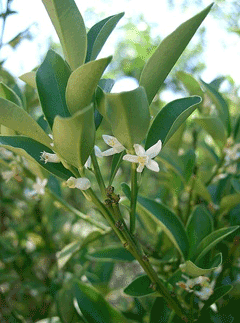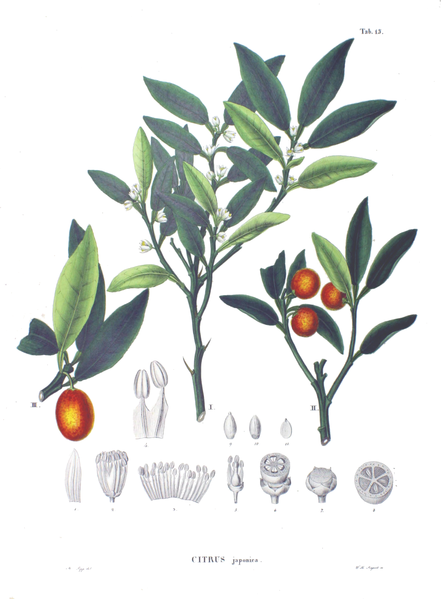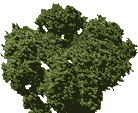 |
|
http://commons.wikimedia.org/wiki/User:KENPEI |
 |
| http://commons.wikimedia.org/wiki/File:Citrus_japonica_SZ15.png |
Translate this page:
Summary
Physical Characteristics

 Fortunella is an evergreen Shrub growing to 2.5 m (8ft 2in).
Fortunella is an evergreen Shrub growing to 2.5 m (8ft 2in).
See above for USDA hardiness. It is hardy to UK zone 9 and is frost tender. It is in leaf all year. The species is hermaphrodite (has both male and female organs).
Suitable for: light (sandy), medium (loamy) and heavy (clay) soils. Suitable pH: mildly acid, neutral and basic (mildly alkaline) soils. It can grow in semi-shade (light woodland) or no shade. It prefers moist soil.
UK Hardiness Map
US Hardiness Map
Synonyms
Citrus japonica.
Plant Habitats
Edible Uses
Fruit - usually cooked and used in jellies, preserves etc[183] or used as a flavouring, but it can also be eaten raw. The whole fruit, including the peel, is eaten[3, 132]. The fruit is acid whilst the peel is sweet[3, 132]. The peel is golden-yellow, smooth, thinner and somewhat sweeter than the oval kumquat, F. margarita[183]. The fruit is rich in pectin and makes excellent marmalades and jellies[240]. Vitamin C content is up to 0.24 mg/cc[240]. The fruit is about 4cm long[260].
References More on Edible Uses
| Composition
|
| Figures in grams (g) or miligrams (mg) per 100g of food.
|
|
|
Fruit (Dry weight)
|
|
- 356 Calories per 100g
- Water : 0%
- Protein: 5.2g; Fat: 2.5g; Carbohydrate: 89g; Fibre: 10g; Ash: 3.3g;
- Minerals - Calcium: 240mg; Phosphorus: 300mg; Iron: 5.5mg; Magnesium: 0mg; Sodium: 835mg; Potassium: 1172mg; Zinc: 0mg;
- Vitamins - A: 1000mg; Thiamine (B1): 0.74mg; Riboflavin (B2): 0.4mg; Niacin: 4.2mg; B6: 0mg; C: 305mg;
- Reference: [ 218]
- Notes: The figures given here are the median of a range given in the report.
|
|
Medicinal Uses
Plants For A Future can not take any responsibility for any adverse effects from the use of plants. Always seek advice from a professional before using a plant medicinally.
The plant is antiphlogistic, antivinous, carminative, deodorant, stimulant[178, 218]. The leaves and fruit contain an essential oil, whilst the fruit also contains sugars and organic acids[283]. The fresh fruit is antitussive and expectorant - in Vietnam it is steamed with sugar candy and used in the treatment of sore throats[283]. It is said to be very good for infants[283].
References More on Medicinal Uses
The Bookshop: Edible Plant Books
Our Latest books on Perennial Plants For Food Forests and Permaculture Gardens in paperback or digital formats.

Edible Tropical Plants
Food Forest Plants for Hotter Conditions: 250+ Plants For Tropical Food Forests & Permaculture Gardens.
More

Edible Temperate Plants
Plants for Your Food Forest: 500 Plants for Temperate Food Forests & Permaculture Gardens.
More

More Books
PFAF have eight books available in paperback and digital formats. Browse the shop for more information.
Shop Now
Other Uses
The fresh leaves and young twigs yield 0.21% essential oil that might be suitable for perfumery[240].
Special Uses
References More on Other Uses
Cultivation details
Prefers a moderately heavy loam with a generous amount of compost and sand added and a very sunny position[200]. Prefers a pH of 5 to 6[200]. Plants are intolerant of water logging[200]. This species is not hardy in the colder areas of the country, when dormant it tolerates temperatures down to about -5°c[200]. The young growth in spring, even on mature plants, is frost-tender and so it is best to grow the plants in a position sheltered from the early morning sun[K]. Kumquats are widely cultivated in China for their edible fruit, there are many named varieties[3]. The plant is less vigorous, somewhat thorny and considerably more cold tolerant[183] (the report gives no details of what this is in comparison to!). Kumquats are hardier than the various Citrus species since they cease growth when temperatures drop below 13°c but, for best results, it is best to grow them in a climate where temperatures do not fall lower than between 4 and 10°c[3]. This is because the fruit is sweeter when it ripens in warm conditions[3].
References Carbon Farming Information and Carbon Sequestration Information
Temperature Converter
Type a value in the Celsius field to convert the value to Fahrenheit:
Fahrenheit:
The PFAF Bookshop
Plants For A Future have a number of books available in paperback and digital form. Book titles include Edible Plants, Edible Perennials, Edible Trees,Edible Shrubs, Woodland Gardening, and Temperate Food Forest Plants. Our new book is Food Forest Plants For Hotter Conditions (Tropical and Sub-Tropical).
Shop Now
Plant Propagation
Seed - best sown as soon as it is ripe in a warm airy position in a greenhouse. When they are large enough to handle, prick out the seedlings into individual pots and grow them on in a greenhouse for at least their first two winters. Plant out in late spring or early summer after the last expected frosts and give some winter protection from the cold for a year or two.
Other Names
If available other names are mentioned here
Native Range
TEMPERATE ASIA: China (Guangdong Sheng, Zhejiang Sheng), Hong Kong
Weed Potential
Right plant wrong place. We are currently updating this section.
Please note that a plant may be invasive in one area but may not in your area so it's worth checking.
Conservation Status
IUCN Red List of Threatened Plants Status :

Growth: S = slow M = medium F = fast. Soil: L = light (sandy) M = medium H = heavy (clay). pH: A = acid N = neutral B = basic (alkaline). Shade: F = full shade S = semi-shade N = no shade. Moisture: D = dry M = Moist We = wet Wa = water.
Now available:
Food Forest Plants for Mediterranean Conditions
350+ Perennial Plants For Mediterranean and Drier Food Forests and Permaculture Gardens.
[Paperback and eBook]
This is the third in Plants For A Future's series of plant guides for food forests tailored to
specific climate zones. Following volumes on temperate and tropical ecosystems, this book focuses
on species suited to Mediterranean conditions—regions with hot, dry summers and cool, wet winters,
often facing the added challenge of climate change.
Read More
Expert comment
Author
(Thunb.)Swingle.
Botanical References
200275
Links / References
For a list of references used on this page please go here
Readers comment
| Add a comment |
|
If you have important information about this plant that may help other users please add a comment or link below. Only comments or links that are felt to be directly relevant to a plant will be included. If you think a comment/link or information contained on this page is inaccurate or misleading we would welcome your feedback at [email protected]. If you have questions about a plant please use the Forum on this website as we do not have the resources to answer questions ourselves.
* Please note: the comments by website users are not necessarily those held by PFAF and may give misleading or inaccurate information.
To leave a comment please Register or login here All comments need to be approved so will not appear immediately.
|
|